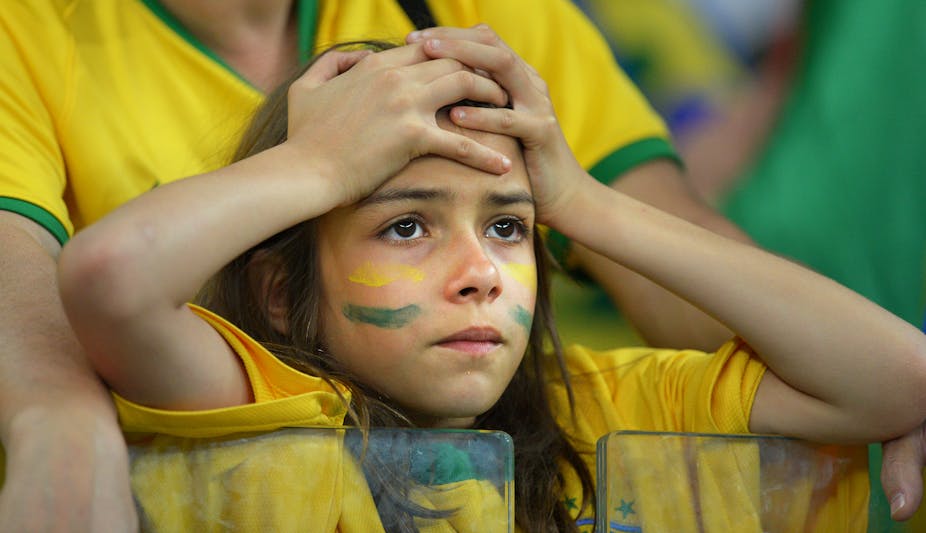The extraordinary 7-1 defeat of Brazil by Germany in the World Cup semi-final is richly ironic. Many Brazilians had hoped that by hosting the World Cup in 2014, their country could finally exorcise the ghost of the 1950 Maracanazo — the 2-1 defeat to Uruguay in the last match of the last World Cup to be held in Brazil. And in a way it has.
But this has not happened as was originally imagined, with the national team of the host nation lifting the trophy in triumph in the Maracanã stadium in Rio. Instead, the Maracanazo has been eclipsed by a performance so shocking, so inept, so below the standards of artistry, flair, and superiority set by earlier versions of the national team, the seleção, that the 1950 defeat pales in comparison. The only hope can be that in the embers of a team that crashed and burned, there might be an opportunity to recast Brazil’s international profile as well as reforming the mechanics of its footballing obsession.
Redemption
The semi-final disaster raises three interesting questions. First, can Brazil redeem itself in the match for third place scheduled for Saturday July 12? This will be more complicated if the opponent is Argentina, as it would be more humiliating to lose to them. However, it is likely that the team will dust itself off and try to salvage some dignity in this game. Likewise, the nation will probably carry on being a good host of the World Cup for the few days of the tournament that remain.

Second, does this defeat mean that Brazilian football needs to be reformed? Some of the most thoughtful commentators in Brazil are suggesting that it does. In other words, this game was not a freak accident, and Brazilian football has been resting on its laurels since its last World Cup win in 2002. In this vision, reform would mean not just getting a new coach but looking at the entire organization and procedures of the Brazilian Football Confederation (CBF) and how it runs its finances, recruits its coaching staff and trains the players on the national team.
The national team’s assistant coach Carlos Alberto Parreira once said that the CBF was an example of the Brazil that works, but many of his compatriots would now disagree. Brazilians might now have lost trust in the CBF, as they have in so many other national institutions. Reform could also mean going to the club level as well, and trying to clean up club finances, root out corruption, bring more fans back to the stadiums, and perhaps retain more top players in the domestic game. Many Brazilians will call for such reforms, in the belief that they offer the only hope of crafting a national team capable of winning another World Cup. In this respect, the semi-final humiliation could have a positive impact.
Beyond the Jogo Bonito
A different response would be to ask: do Brazilians still want football to be such an important part of their national identity? Should it matter so much to the country that its team was trounced on home soil in a semi-final match?
The country is richer, more diverse, and more pluralistic than it was in 1950, when losing to Uruguay in the World Cup seemed like such a national tragedy to so many. In the mid-20th century, with all its barriers (including language), perhaps it made sense that symbols of Brazilian nationality came from nature or expressions of the human body, especially dance and football.
But in the globalized early 21st century, why should football be such an important part of the soul of the country? Many Brazilians speak English and know the world, and translation is easier than before, so why can’t Brazilian national identity be expressed just as well in science, in literature, in technology, or in other sports as it is in football? In this respect the idea that the Brazilian team represents the nation on the pitch might be something of a mid-20th century anachronism. As an editorial in the Folha de São Paulo newspaper put it: “Brazil is bigger than its football”, and has more important challenges than winning the next World Cup.

It is unlikely that Brazil’s sporting defeat will have an immediate, direct impact on the presidential election campaign that is now fully underway, but that campaign will raise the sorts of questions that the dream of a sixth World Cup championship only postponed. These include, how can the country become both more competitive and less unequal? How can it improve the quality of the public goods produced by the state, most crucially education, health care, and public transportation?
Can trust in the country’s representative institutions be restored, and if so, how? And how can Brazil use its growing influence in the world to make a positive difference? The presidential campaign, which will culminate in a first-round election on October 5 (and a probable second round on October 28), should give us some answers to the first three questions. The 6th BRICS Summit, which Brazil is hosting in Fortaleza immediately after the World Cup final, might give us a glimpse of a possible answer to the last.

